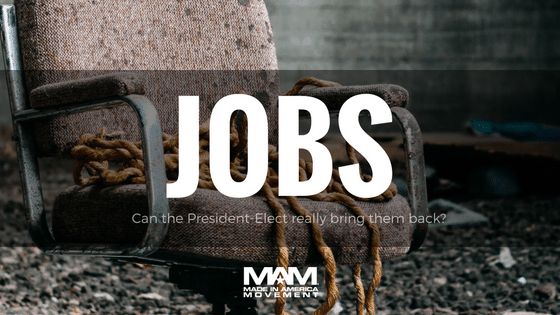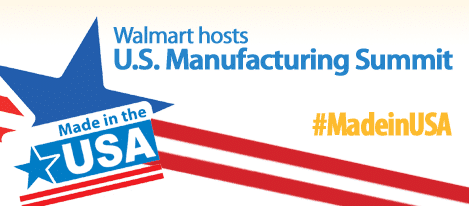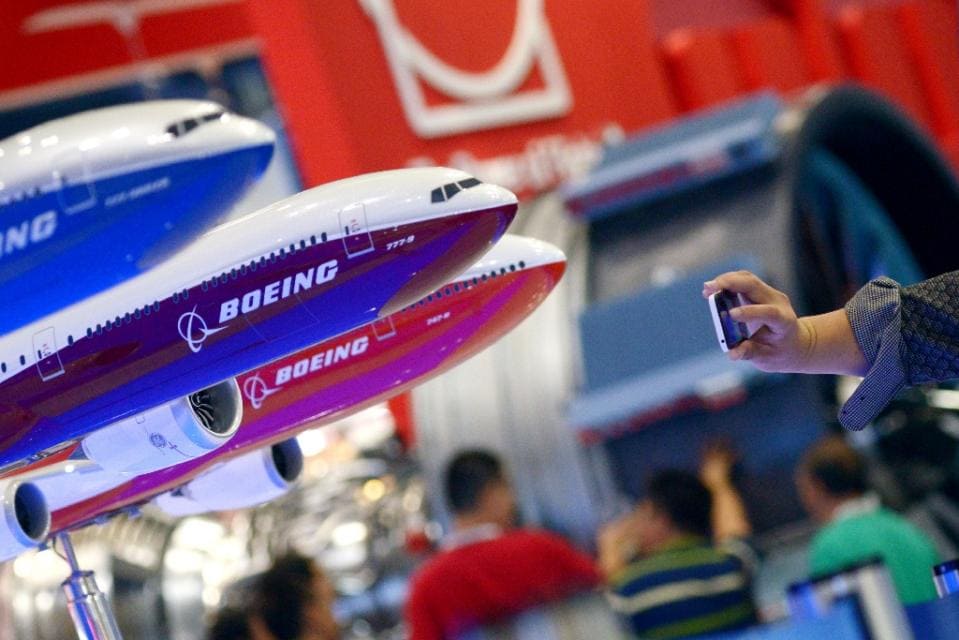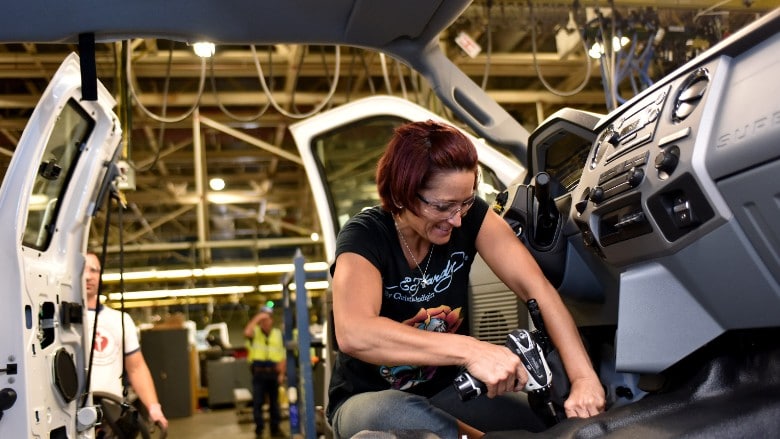Trump Supporters Anxious For Jobs To Come Back To USA
By the time the Chicago Cubs won the World Series for the first time in 108 years this month, Paul Roell was already asleep. He did not stay up to see Barack Obama win the presidency in 2008, or watch in 2000 as the margin of votes separating George W. Bush and Al Gore in Florida shrank to the vanishing point.
After all, he has to clock in daily at 5:30 a.m. at the soon-to-be-shuttered Carrier factory here, where he has worked 17 years.
But shortly before 3 a.m. Wednesday, when the networks projected that Donald J. Trump would be the next president of the United States, Mr. Roell was wide awake. His wife, Stephanie, was up, too, and they exchanged high fives in the wee hours.
In fact, Mr. Roell was so keyed up, he did not sleep at all that night and headed straight to the plant before sunrise, bleary-eyed but euphoric. “I don’t watch sports, but this was my World Series,” he said.
It is precisely this level of enthusiasm, from Mr. Roell and millions of like-minded Americans, that pollsters and the campaign of Hillary Clinton did not appreciate, even though it was vividly on display in February after a video went viral showing furious Carrier workers here learning from management that their jobs would be going abroad.
Carrier’s decision to move the factory to Monterrey, Mexico, will eliminate 1,400 jobs by 2019. Mr. Trump quickly made the factory Exhibit A in his argument against the trade policies of Republicans and Democrats alike.
He cited Carrier again and again on the campaign trail, threatening to phone executives at the company and its parent, United Technologies, and to hit them with 35 percent tariffs on any furnaces and air-conditioners they imported from Mexico. To the cheers of his supporters, he predicted at rallies that Carrier would call him up as president and say, “Sir, we’ve decided to stay in the United States.”
Now his supporters expect action. “If he doesn’t pass that tariff, I will vote the other way next time,” warned Nicole Hargrove, who has worked at Carrier for a decade and a half and is not certain what she will do if and when her job goes to Mexico.
Carrier isn’t changing its plans. On Friday in a written statement, the company said, “We are making every effort to ease the transition for our Carrier colleagues in Indiana.” The company pointed out that it will finance four-year retraining and educational programs for employees and provide financial help.
For Mr. Trump, now comes the hard part. In interviews in recent days and in March, Trump voters here made clear that if he does not follow through on his promises, they are prepared to turn on him, just as they are seemingly punishing Democrats today for not delivering the hope and change voters sought from President Obama after he won as an outsider in 2008.
And while Mr. Roell is a conservative, Mr. Trump’s tough talk about Carrier, the economy and the future of American manufacturing jobs also appealed to moderates like Darrell Presley, a steelworker in rural Crawfordsville, Ind., who voted for Mr. Obama in 2008. “He was for change, and said he would take care of the middle class, but he didn’t live up to those expectations,” Mr. Presley said. “I feel like the American people are at the point where they’ve had it, and this was the last chance.”
Last Tuesday, blue-collar workers across the industrial heartland hearkened to Mr. Trump’s call, putting states never thought to be in serious play, like Wisconsin and Michigan, in his win column.
As president, however, Mr. Trump will face a tough balance. Tariffs and trade wars stand to hurt American workers who make products that are exported to Mexico or China. Few voters will be happy paying more for imported goods.
And regardless of who is in the Oval Office, manufacturers are seeing relentless pressure, from investors and rival companies, to automate, replacing workers with machines that do not break down or require health benefits and pension plans. Wall Street hedge fund managers are demanding steadily rising earnings from Carrier’s parent, United Technologies, even as growth remains sluggish worldwide.
The Carrier plant here is plenty profitable. But moving to Monterrey, where workers earn in a day what they make here in an hour, will increase profits faster.
Mr. Roell, who earns about $55,000 a year with overtime as a team leader making furnaces, has few illusions about the gulf separating him from Mr. Trump, or the global headwinds that American factory workers face. “His father was a millionaire, he’s a billionaire,” Mr. Roell said, sitting at Sully’s Bar & Grill on Thursday night opposite the factory with fellow Carrier workers. “His son Barron’s allowance is probably more than my salary.”
Nor does he underestimate the profound economic threat to the 1,400 workers at the factory, where layoffs are expected to begin next summer and continue in waves until it closes in 2019. Mr. Roell was promoted to team leader in March.
The mood in the factory has worsened since. Senior engineers travel from Indianapolis to Monterrey to supervise the shifting of production lines to Carrier’s factory there, workers and union officials said. Mexican engineers, in turn, have been coming here, measuring and assessing the machines they will operate south of the border, unless, of course, Mr. Trump can deliver on his promise.
“It’s demoralizing when you see them taking pictures,” Mr. Roell said. “It’s like you are getting divorced but you are still living with your wife and her new boyfriend is coming over.”
A Drought of Good Jobs[p][/p]
For workers like Mr. Roell, 36, who started at Carrier just weeks after receiving his high school diploma and never returned to school, the problem is not a shortage of jobs in the area. Instead, it is a drought of jobs that pay anywhere near the $23.83 an hour he makes at Carrier, let alone enough to give him a toehold in the middle class.
When he drives to work each day before dawn, Mr. Roell passes warehouse after warehouse of giants like Walmart and Kohl’s with “Help Wanted” signs outside promising jobs within. The problem is that they typically pay $13 to $15 an hour.
“I guess I could work two full-time shifts a day,” he joked.
The situation confronting Mr. Roell and other blue-collar Carrier workers is not simply one anecdote from the region some people call the Rust Belt. It is part of a broad predicament for non-college-educated workers borne out by Census Bureau data. And it explains why even in Indiana, a state with a lower rate of unemployment than the national average, and a strong rebound from the recession in many ways, the economic and political frustration is palpable.
Since 2010, the private sector in Indiana has added roughly 300,000 jobs, bringing the unemployment rate from a high of 10.9 percent in January 2010 (nearly a percentage point above the national average) to 4.5 percent now (nearly half a percentage point below the national unemployment rate).
But nearly all that growth occurred in the service sector — hotel and food-service jobs, or health care technicians, or workers in the warehouses Mr. Roell drives past — which added more than 220,000 positions for a total of 1.9 million today. While manufacturers added 85,569 jobs since the sector bottomed out at 434,919 in January 2010, factory employment in Indiana over all remains significantly below where it was before the Great Recession.
And service jobs do not come close to paying what manufacturing jobs do. According to the Census Bureau, the typical service sector position in Indiana paid $39,338 in 2015, compared with $59,029 for a manufacturing position.
The cross-generational drop-off can be stark, and it scars families. Within Local 1999 of the United Steelworkers union, which includes workers at Carrier and other local industrial employers, members typically start at $17 an hour, according to Chuck Jones, Local 1999’s president. For comparison, his 21-year-old granddaughter Haley Duncan is about to finish college and take a job in health care that pays $14.50 an hour.
Ms. Duncan and her older brother, Drake, were tempted by factory work. But Mr. Jones and their parents told them to forget it and stay in school because, while manufacturing might pay more, its future is becoming more precarious. The Rexnord bearing factory here — where Mr. Jones started working fresh out of high school in 1969 and where his stepson works now — last month said it might follow Carrier to Mexico and eliminate at least 300 jobs.
Related Article: Carrier: Anger, Resignation as Massive Pay Gap Prompts Loss of Jobs, Mexico Move[p][/p]
Can Mr. Trump, with his promises to bring these jobs back and his calls to retaliate against chief executives if they do not listen, stem the tide?
Broader economic trends suggest Mr. Trump will face an uphill struggle even if he does follow through on his threat to pressure Carrier’s executives or hit the company with steep tariffs. What is more, while the bully pulpit of the president is something corporate chieftains fear, Rexnord’s plan to pull up stakes even after the Carrier situation suggests businesses will not bow to the threat of bad P.R.
And even if Congress and the White House agree on a plan to increase manufacturing, tax credits for research and new investments, for example, or financing apprenticeships as European countries do, automation will continue to claim jobs.
“I’m pretty skeptical Trump’s policies will reverse this process,” said John Van Reenen, a professor of economics at M.I.T. who studies how technology and innovation affect profits and wages at companies. “These are fundamental forces that have more to do with technology than trade.”
In particular, he said, across developed economies more national income is going to capital, that is, owners and shareholders, rather than labor. “We’ve seen this in many countries with different political systems,” he said. “It’s a winner-take-all world.”
Even Robin Maynard, a Carrier team leader who enthusiastically backed Mr. Trump, acknowledges that even a phone call from the Oval Office to the company’s executive suite might not be enough to save his job. “Hopefully, he can do something for us,” Mr. Maynard said. “But I think it’s out of the C.E.O’s hands. It’s in the hands of the shareholders.”
In this age of 401(k) investment plans and individual retirement accounts, these shareholders are, in a real sense, all of us. But for the Carrier workers in Indianapolis and millions of other blue-collar workers, no matter how they voted, nuances like that do not matter so much now. Just the hope that Mr. Trump will try to reverse the long decline in their neighborhoods, their living standards and even their longevity is an emotional balm.
“He doesn’t like blacks. He doesn’t like Hispanics. He doesn’t like disabled people,” said Jennifer Shanklin-Hawkins, who, like roughly half the Carrier factory workers, is African-American. “He’s not presidential material. But my husband and I weren’t mad or upset when he won. I know blacks who voted for him, and I want to give him a chance.”
Diversity and Distrust[p][/p]
Some blue-collar neighborhoods that supported Mr. Trump have been portrayed as monocultures, the opposite of supposedly more diverse, cosmopolitan cities that favored Mrs. Clinton, the Democratic candidate. That caricature does not hold up here.
At least half of the workers on Carrier’s assembly line are women. And dozens of Burmese immigrants have gone to work at the factory in recent years, part of an influx of nearly 15,000 refugees from Myanmar into Indianapolis since 2001.
“It can be hard to communicate, but they work very hard,” Mr. Maynard said. “They don’t complain, and I love their work ethic.”
And the neighborhoods around Carrier’s factory are considerably more diverse than many wealthy New York and San Francisco suburbs, where Democrats dominate.
Down the road from the Carrier factory, past the railroad tracks and a few patches of farmland that remain in Indianapolis, the tidy neighborhood of split-level and ranch houses where Cecil Link Jr. lives has changed in recent years. A worker at a plastics factory nearby, Mr. Link noted that a Hispanic family recently moved in next door, and he said he was pleased that blacks and whites now socialize in ways almost unimaginable decades ago.
“It pains me to see this country divided by race,” Mr. Link said. Nevertheless, he voted for Mr. Trump.
The last time he voted in a presidential election was 1992, when he cast his ballot for Bill Clinton. But this time, he said, he registered explicitly to vote for Mr. Trump. “I was tired of corruption and lies in Washington,” he said. “I just wanted a non politician like Trump.”
Mr. Presley, the 59-year-old white Crawfordsville steelworker who voted for Mr. Obama in 2008 and Mr. Trump in 2016, was even more emphatic that racial resentment or ethnic bigotry was not behind his support for Mr. Trump. “I grew up on the West Side of Indianapolis in a racist environment,” he said. “But I went to a high school that was 57 percent black, and I played football with a lot of black guys and we became close friends. I learned not to be racist.”
Instead of bias, what animates these voters, whatever their race or political orientation, is a profound distrust and resentment of wealthier, educated Americans, a group they say lacks a connection to them and does not care about their economic situation. And to them, Mrs. Clinton seemed at least as elite as Mr. Trump, if not more so.
“I just couldn’t bring myself to vote for him, but both candidates are evil,” said Ms. Shanklin-Hawkins, who reluctantly voted for Mrs. Clinton, but has never forgiven her for her remarks about “superpredators” in the 1990s, or the mandatory prison sentencing guidelines Mr. Clinton signed into law as president.
“Hillary hasn’t sweated a day in her life, unless it was losing a tough case as a lawyer,” Mr. Maynard said. “We wanted to take America in a different direction. I’m just hoping Trump will do what he says.”
Can the Democratic Party recapture these voters if Mr. Trump does not deliver? Senator Sherrod Brown of Ohio, among the most liberal Democrats in the Senate, contends it can, if Democrats follow his lead in appealing to working-class concerns and opposing free trade deals like the North American Free Trade Agreement and the proposed Trans-Pacific Partnership, a pact with Asian nations that President Obama supported.
Of course these, too, are Mr. Trump’s positions.
Mr. Presley readily acknowledges that Mr. Trump is a billionaire with an Ivy League education.
“But he gets that the country is in bad shape.” Mr. Presley said. “Sure, he made some mistakes and sometimes he went a little overboard, but the guys I work with related to it. If we spoke in public, we’d make mistakes too.”
To them, it’s not only the country that’s in bad shape. So are the institutions that once provided structure to working-class life in America. Many Carrier workers are regular churchgoers, but Ms. Hargrove said she was deeply troubled by how priests abused children, or how the police shot suspects even though their arms were raised in the air.
“Things are chaotic,” she said.
The distrust is evident even within the Steelworkers union, another institution that once provided a support system for workers. Mr. Roell is leery of area leaders like Mr. Jones of Local 1999, who had battles of his own with the union’s top officials over their support for Mrs. Clinton.
A fierce supporter of Bernie Sanders, Mrs. Clinton’s rival for the Democratic nomination, Mr. Jones and Local 1999 did not make an endorsement in the general election. “I held my nose and voted for her,” he said between drags on a Marlboro at the local’s union hall. “I didn’t trust her a bit. I told people she would flip on trade deals after she was elected.”
“I’m as left-wing as you can find, and I thought Trump was full of it,” he said. “But everybody is tired of the same old politicians. It could have been Captain Kangaroo and he might have won.”
As for the candidate who did win, Mr. Trump, the union leader said he was waiting for him to make that phone call to Carrier. “He’s got time. He doesn’t take the oath of office until Jan. 20,” Mr. Jones said. “Trump made Carrier the poster child and said he would hold Carrier accountable. Well, we’re going to hold him to it.”
SOURCE: NYTIMES









You must be kidding, first of all Carrier for one will only pass along all additional costs to import into their own country onto the US buyer, do you really think this scares them or any other US company, the tariff will be less from China so get ready to have Chinese made AC in your house. The Royal Court Juster is going to deliver nothing including a wall, the whole world is laughing. This is what is called “a world economy”, the world at this moment is in chaos economically, politically and every other way, it is going though a phase that needs to work itself through but stirring the pot to make yourself look powerful is only going to make the other parts of the world ban together and leave us in the dust, nothing but idiotic rhetoric. If you have any level of education you must deal with the future, all companies will eventually become Tesla, fully automated, with the level of engineering and artificial intelligence they can create a machine to do your job in 30 days, so get used to it, this is the future. Welcome to the world which the rest of the world has been living in for dozens of years, people of all countries have migrated for work, tag you’re it, it is now your turn now, but if you stop this poor excuse of a buffoon from doing more damage you may just be able to put your passport back in your undie draw for a far later date. Until November 9th the US was the one country to look to for guidance including economically, the jobs that left were shipped to other countries were done to by US companies in the name of putting “more money in their own pockets”, not just of lower wages, they don’t and he included has not and will not give 2 cents about your future, do you thing for a minute that someone with that much money that has never given anything back really gives a damn about you or your family. He didn’t create thousands of jobs the GC’s that did the work for him create the jobs and then this con man of a business man didn’t even pay them for their work. And now he wants to eliminate Dodd Frank, let’s have a big party on Wall Street because the good times they are u coming. The stocks that rose after the election were Health Insurance, Pharmaceuticals and the Banks, the fix is in, good luck, inflation is coming and its going to come big, your home will devalue and since you have no money in the back your returns will continue to be 1/8 of a point on interest on your account, and if rates do rise and they will the bank will not pay you more than they are paying now, they are going to keep your interest. What fools you are.